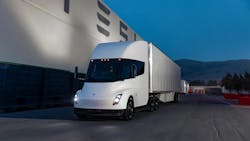Tesla Semi 'performed well' in pilot, ABF Freight says
Logistics company ArcBest recently completed a pilot of the Class 8 Tesla Semi in over-the-road operations through its less-than-truckload carrier ABF Freight that provides more clarity into the controversial battery-electric truck's capabilities.
Over the three-week test period, ABF operated a Tesla Semi on the steep stretch of Interstate 80 that cuts through the Sierra Nevadas between Reno, Nevada, and Sacramento, California. The carrier also conducted some regional runs in the Bay Area as well. In total, the truck logged 4,494 miles and averaged 321 miles per day, with an energy efficiency of 1.55 kWh per mile.
According to the company, the Tesla Semi “performed well” on a variety of routes, including a 7,200-ft. climb over Donner Pass, generally matching the performance of diesel trucks.
“We’re not looking for a truck that performs well ‘for an EV,’” ABF Freight president Matt Godfrey said. “It must meet or exceed the performance and total cost of ownership targets of our most efficient diesel units. This pilot gives us great insight into the potential of EV semis in our operations.”
The Tesla Semi was first unveiled in 2017, when Tesla CEO Elon Musk claimed that the truck would reach up to a 500-mile range, accelerate from 0 to 60 mph in under 20 seconds fully loaded, cost $150,000, and go into production in 2019. That didn't happen and trucking insiders questioned if the Semi would ever be commercialized.
The polarizing truck finally went into limited production in late 2022, with PepsiCo as an early adopter. The following year PepsiCo later participated in the NACFE's Run On Less – Electrical Depot event with the Tesla Semi. The rigorous 18-day, third-party test yielded promising results. NACFE found that one PepsiCo’s three Tesla Semis travelled 410 miles on a single charge and 1,076 miles in a full day. For 60% of those miles, the Semi’s GVWR was above 70,000 lbs.
Now, full production for the Tesla Semi is set for 2026 at the Nevada Giga factory, which will have a future capacity of 50,000 Semis annually, Tesla reaffirmed at Act EXPO 2025. But the question remains if the trucks can maintain their range and battery capacity when operating for longer periods than a few weeks.
“The big question is if you can really make the battery reliable over the lifetime of the battery,” noted Jeff Seger, clean energy consultant at NACFE, said to Fleet Maintenance last year. “If you’re fast charging all the time, what’s the degradation of the battery?”
While only time will tell, a Recurrent study of 12,500 Tesla consumer EVs found that frequently using the 250-kw Tesla Supercharger did not affect a vehicle’s range.
About the Author

Alex Keenan
Alex Keenan is an Associate Editor for Fleet Maintenance magazine. She has written on a variety of topics for the past several years and recently joined the transportation industry, reviewing content covering technician challenges and breaking industry news. She holds a bachelor's degree in English from Colorado State University in Fort Collins, Colorado.
